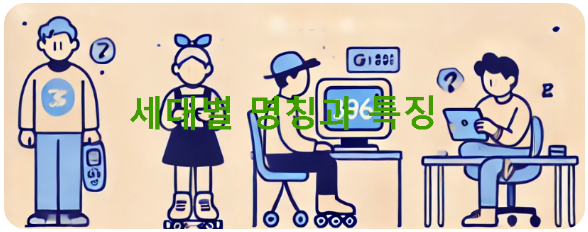Generational Names and Characteristics in South Korea: Understanding Our Diverse Eras
Generational Names and Characteristics in South Korea: Understanding Our Diverse Eras
South Korea has undergone rapid economic growth and profound social changes, resulting in each generation developing unique characteristics. From the post-war reconstruction period through industrialization, democratization, and the digital revolution, every generation has experienced a distinct era that shaped its values and culture. These generational traits reflect South Korea’s singular development process.
In recent times, stark differences in upbringing and environment have sometimes caused generational conflicts. In this article, we explore the characteristics of each generation, aiming to foster understanding of their lived experiences and build bridges for harmonious coexistence.
 |
| Generational Names and Characteristics in South Korea |
Generational Names and Features in South Korea
1. Baby Boomers (Born 1955–1963) – “The Generation Raised Amidst War’s Aftermath”
Historical Background
Following the devastation of the Korean War (1950-1953), South Korea was in ruins. With aid from the United States, economic reconstruction gradually began. During the 1960s, the Park Chung-hee administration implemented its Five-Year Economic Development Plans, sparking rapid industrial growth. Birth rates surged during this period, creating the baby boomer generation.
Characteristics
-
Grew up in large extended families with a strong sense of community.
-
Firm belief in the idea that “a dragon can emerge from a humble stream,” symbolizing the belief that hard work leads to success.
-
Valued lifetime employment and preferred stable careers in public service, large corporations, or education.
-
Key contributors to South Korea’s industrialization and economic miracle.
2. The 386 Generation (Born Late 1960s–Early 1970s) – “The Champions of Democratization”
Historical Background
The 1970s and 1980s were a period of accelerated industrialization and economic growth, but also marked by military dictatorship. Pro-democracy movements became vigorous, culminating in the June Democratic Uprising of 1987, which restored direct presidential elections and advanced Korean democracy.
Characteristics
-
The name “386” denotes people in their 30s during the 1990s, born in the 1960s, and who attended university in the 1980s.
-
Actively participated in democratic and labor movements, showing strong social responsibility.
-
Deeply involved in civic activism, political reform, and labor rights.
-
Later took prominent roles in politics, business, and education in the 2000s.
3. Generation X (Born 1970s–Early 1980s) – “The Rise of Individualism and New Culture”
Historical Background
From the late 1980s to the early 1990s, South Korea achieved economic stability and increased Western cultural influence. The 1988 Seoul Olympics placed Korea on the global stage. During the 1990s, popular culture—music, film, fashion—flourished.
Characteristics
-
Known as “Generation X” for their strong individuality and tendency to challenge established norms.
-
Led trends such as pagers, PC communications (Chollian, NowNuri), roller rinks, and hip-hop culture.
-
More individualistic than the Baby Boomers, valuing self-development and personal expression.
-
Experienced the economic uncertainty of the 1997 IMF financial crisis firsthand.
4. Millennials (Born Early 1980s–Mid 1990s) – “The Digital and Global Generation”
Historical Background
From the late 1990s onward, South Korea experienced the internet revolution. The 1997 IMF crisis caused widespread economic hardship. The 2000s saw accelerated globalization and rising university enrollment.
Characteristics
-
The first generation to grow up using computers and the internet from early childhood.
-
Faced intense academic competition due to credential inflation.
-
Struggled with employment challenges, often favoring stable public sector jobs.
-
Emphasize work-life balance, prioritizing personal happiness over corporate loyalty.
5. Generation Z (Born Late 1990s–Early 2010s) – “Digital Natives”
Historical Background
The 2000s introduced smartphones, dramatically transforming the internet environment. Social media platforms (Facebook, Instagram, YouTube, TikTok) grew in influence, enabling real-time sharing of global culture and trends.
Characteristics
-
Born into a world saturated with smartphones and internet connectivity—true digital natives.
-
Prefer short, impactful content such as short-form videos and bite-sized news.
-
Strong individualism with a focus on personal dreams and identity rather than traditional employment.
-
Value fairness and diversity more strongly than previous generations.
6. MZ Generation (Millennials + Generation Z) – “The Drivers of New Trends”
Historical Background
Since the 2010s, this combined group has led social, economic, and cultural trends. The COVID-19 pandemic accelerated adoption of non-face-to-face culture, including remote work, online education, and the metaverse.
Characteristics
-
The term “MZ Generation” collectively refers to Millennials and Generation Z.
-
Display unique consumption patterns, favoring brands that resonate emotionally and socially.
-
Embrace lifestyles centered around ‘YOLO’ (You Only Live Once) and ‘small but certain happiness’ (소확행).
-
Highly concerned with environmental sustainability and social responsibility.
7. Generation Alpha (Born After 2010) – “The AI-Integrated Generation”
Historical Background
The 2020s are marked by rapid advances in AI, big data, the metaverse, and autonomous vehicles, fundamentally reshaping education and play.
Characteristics
-
Growing up surrounded by AI assistants, robots, and AR/VR technologies.
-
Accustomed to online learning and non-face-to-face educational settings.
-
Emphasize creativity and self-directed learning more than previous generations.
Conclusion: As Times Change, So Do Generations
Each generation develops distinct values and perspectives shaped by their unique historical and social contexts. Understanding and respecting these differences is key to reducing generational conflicts.
By appreciating the roles each generation has played in South Korea’s journey from the past to the present, we can enhance intergenerational communication. This understanding fosters a more empathetic society, where differences are acknowledged, respected, and harmonized.
 |
| South Korea's rapid economic development has led to distinct life experiences across different generations. |
View Korean Version
대한민국 세대별 명칭과 시대 이야기(베이비붐세대,386세대,X세대,M세대,Z세대,MZ세대, 알파세대)



Comments
Post a Comment